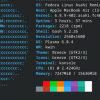Watching Gentoo Linux grow up
The Gentoo Foundation's Gentoo Linux has quickly grown into one of the world's most popular Linux distributions. However, Gentoo's non-commercial status, as well as its reputation as a bleeding-edge distribution for Linux system tweakers, has so far dimmed its prospects for enterprise adoption.
That said, Gentoo Linux is maturing quickly, and the system's source code-based software installation mechanism makes Gentoo a flexible distribution and a good fit for testing the latest versions of key open-source software components.
At this point, eWEEK Labs would hesitate to recommend Gentoo for broad production use, but, based on our research and testing of Gentoo, it's a distribution that's certainly worth keeping an eye on. (Administrators interested in learning more about Gentoo should check news.gmane.org/gmane.linux.gentoo.server.)
Most Linux distributions consume applications and updates in the form of binary packages that have been precompiled to work with a particular distribution version, such as with Red Hat Inc.'s Red Hat Enterprise Linux 3 or the Debian Project's current Stable release. Customization is possible when a particular application requires libraries that are older, newer or compiled with options different from the ones the distributor chose, but this can lead to software dependency issues that can be difficult to manage.









































































